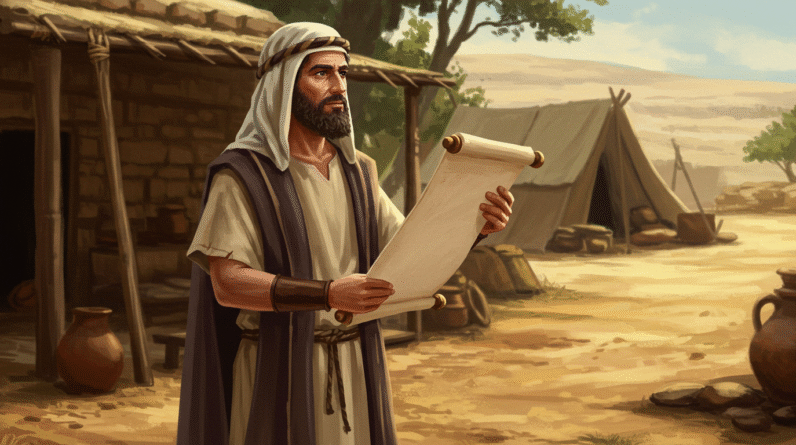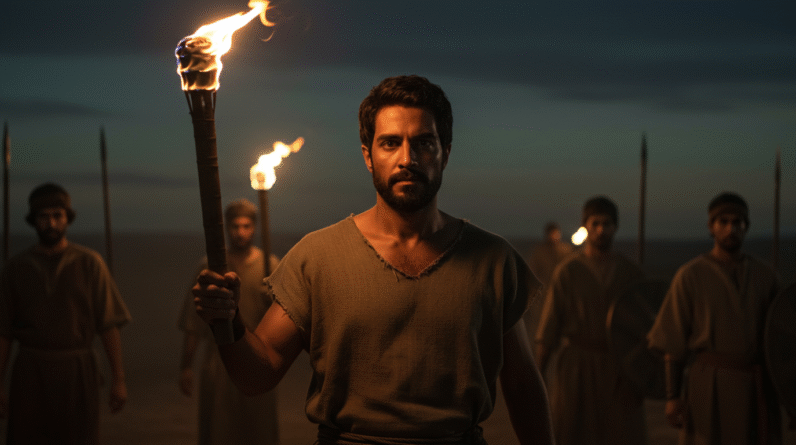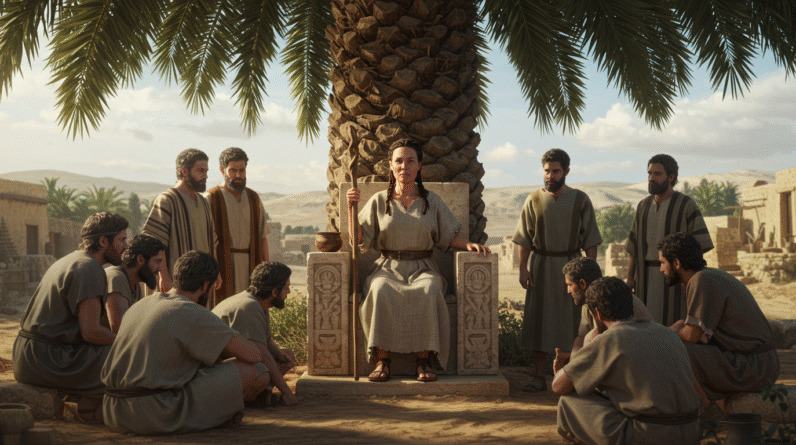Leadership Lessons from Deborah: How to Lead with Courage and Faith
Dive into the pages of history, and you’ll find stories like those of Deborah—narratives that ripple through time, teaching us invaluable lessons about leadership marked by courage and faith. In the Bible, Deborah stands as an emblematic figure of strength and resolve, serving as both a prophetess and a judge of Israel. If you’ve ever felt overwhelmed by the challenges of leadership or the daunting nature of decision-making, Deborah’s journey offers profound insights that are as relevant today as they were millennia ago. This article will delve into “Deborah leadership lessons,” unraveling how she led with unparalleled bravery and unwavering belief.
Who Was Deborah?
At first glance, Deborah’s story could appear like a tapestry woven intricately with faith and determination. Regarded as one of the standout leaders in biblical history, her story is found in the Book of Judges. But who was Deborah? Not just a leader, Deborah was a wife, prophetess, and judge—a multifaceted personality who broke through the confines of her era’s societal norms. Her leadership transcended gender norms, and her narrative has been a source of inspiration for many aspiring leaders seeking to enact positive change and lead with integrity.
Deborah’s character shines through her unwavering dedication, unmistakable wisdom, and the clarity with which she received and delivered divine messages. Her story is a testament to the potential of every leader, regardless of their circumstances, to influence and guide with strength and resolve.
Deborah’s Leadership in Action
How did Deborah manifest her leadership on the ground level? When Israel faced immense adversity, Deborah rose to the occasion, displaying courage that seemed to flow effortlessly. Beyond titles and honors, she was a person of action whose leadership was defined by her deeds.
In the time of crisis, as depicted in Judges 4:6-7, Deborah took the initiative to summon Barak, the military leader of the Israelite army. Unlike many of her contemporaries, she did not shrink from conflict but addressed it head-on, guided by her faith and her trust in divine instruction. She didn’t merely lead from the back; instead, she actively participated, setting an example for others to follow.
The Courage of Conviction
What makes courage so indispensable in leadership? In the realm of leadership lessons from Deborah, courage stands out as a pillar on which her effectiveness rested. Leading in times of uncertainty requires more than just mental fortitude; it demands a courageous heart. Deborah exhibited this courage with striking clarity, even when the odds seemed insurmountable.
In Judges 4:8-9, Barak’s hesitation to go into battle without Deborah underscores a critical moment. Her response? A matter-of-fact assertion that she would accompany him, reinforcing her willingness to share the weight of leadership and risk. This interaction illustrates the power of standing firm in your convictions and inspiring confidence in those around you.
Practical Application: Courage in Leadership
Bringing these lessons into modern contexts might seem daunting at first. However, infusing courage into your leadership style isn’t about acting without fear—it’s about recognizing it and forging ahead regardless. Whether you’re navigating corporate boardrooms or community initiatives, the courage to stand by your principles and make difficult decisions is crucial.
- Be the First to Act: Like Deborah’s call to Barak, be unafraid of taking the first step. Leadership sometimes requires moving forward even before others are ready.
- Use Courage to Empower: Encourage others to take brave steps in their roles. An empowered team is often a courageous one.

Leading with Faith
While courage acts as the backbone, faith becomes the spirit animating Deborah’s leadership. Faith in herself, her mission, and in her God enabled Deborah to become a visionary leader. When she spoke, people listened—not simply because of her authority, but because she spoke with conviction rooted in faith.
One of the defining moments in Deborah’s leadership is her song captured in Judges 5. This song wasn’t just a tribute to victory; it was a testimony of faith and gratitude. It salutes both divine intervention and human response, highlighting how faith can harmonize these elements in leadership.
Practical Application: Harnessing Faith
Faith doesn’t merely pertain to religious beliefs but extends to a deeper faith in one’s vision and capabilities. As a leader, maintaining faith when the path ahead is blurred can fortify your resilience and influence those in your sphere.
- Cultivate Visionary Faith: Develop a clear vision, and hold steadfast to it. Faith in a well-defined purpose can drive sustained efforts.
- Communicate with Conviction: Speak confidently about your mission and values. Your faith in these ideals will inspire faith in others.
Communicating with Compassion and Strength
Despite being a formidable leader, Deborah communicated not only with authority but also with compassion. Her ability to communicate decisions and divine instructions effectively is evidenced in Judges 4:14. Her words reflect not just command, but a pulse of empathy and encouragement.
Compassionate leaders understand their teams’ struggles and strive to create an environment that fuels motivation. Deborah shone as a leader who didn’t just demand faith from her followers—she engendered it.
Practical Application: Compassionate Leadership
In today’s fast-paced world, the balance between strength and compassion might seem elusive. However, embracing them in tandem is possible.
- Listen Actively: Acknowledging your team’s concerns can foster an atmosphere of trust and respect.
- Encourage Open Dialogue: Strengthen your team by building a culture where feedback is welcomed and addressed with care.
Decision-Making: Knowing When to Step Forward
Deborah’s story impresses upon us the importance of timely decisions. As a leader, knowing the right moment to act is crucial, a lesson vibrantly illustrated in Deborah’s directive to Barak regarding the time to attack. This decisive moment (Judges 4:14) underscores the essence of seizing opportunities with both courage and wisdom.
An astute leader recognizes these strategic moments and pivots when necessary. Deborah’s keen sense of timing was grounded in her deep understanding of the situation and her faith, which enabled her to lead effectively.
Practical Application: Mastering Decision-Making
Strategic decision-making involves a mix of analysis, intuition, and timing. Here’s how you can integrate these elements into your leadership:
- Analyze and Anticipate: Cultivate an ability to assess situations accurately and predict potential outcomes.
- Trust Your Instincts: Sometimes decisions require more than data. Trusting your gut can often lead you to innovative solutions.
- Embrace Decisiveness: Once a decision is made, commit to it fully, even if the path is strewn with challenges.
The Legacy of Deborah: Inspiring Future Leaders
Deborah’s narrative doesn’t end with her victories—it extends into a legacy that continues to resonate through time. Her life offers a beacon of hope, proving that effective leadership is attainable through courage and faith, regardless of societal constraints or personal adversities.
As we reflect on Deborah’s legacy, the overarching lesson for contemporary leaders is to remain resolute in their ethics and mission while adapting to change. Her story showcases an impressive blend of justice, wisdom, and God-given guidance, critical components for enduring leadership.
Embracing Deborah’s Legacy
To carry forward Deborah’s legacy in your leadership journey, consider these actionable strategies:
- Mentor Emerging Leaders: Share your experiences and insights to cultivate the next generation of leaders intent on leading with integrity and empathy.
- Celebrate Diversity: Encouraging diverse perspectives can lead to more holistic decision-making processes and innovative ideas.
- Promote Resilience: Challenges are part of leadership; embracing them with resilience can further bolster your ability to lead effectively.
Conclusion: Deborah’s Enduring Influence
In contemplating Deborah’s life, what emerges is a portrait of a leader defined by her courage and faith—a timeless testament to the power of steadfast conviction. Her story reminds us that impactful leadership transcends traditional boundaries, inviting those who dare to lead with courage and faith to leave indelible marks.
As you contemplate your leadership journey, let Deborah’s lessons inspire you to manifest courage in the face of adversity and faith amidst uncertainty. Embrace empathy, duty, and decisiveness, and carry forward the legacy of one of history’s unyielding leaders.
Explore More
For further reading and encouragement, check out these posts:
👉 7 Bible Verses About Faith in Hard Times
👉 Job’s Faith: What We Can Learn From His Trials
👉 How To Trust God When Everything Falls Apart
👉 Why God Allows Suffering – A Biblical Perspective
👉 Faith Over Fear: How To Stand Strong In Uncertain Seasons
👉 How To Encourage Someone Struggling With Their Faith
👉 5 Prayers for Strength When You’re Feeling Weak

📘 Jesus and the Woman Caught in Adultery – Grace and Mercy Over Judgement
A powerful retelling of John 8:1-11. This book brings to life the depth of forgiveness, mercy, and God’s unwavering love.
👉 Check it now on Amazon
As a ClickBank Affiliate, I earn from qualifying purchases.
Acknowledgment: All Bible verses referenced in this article were accessed via Bible Gateway (or Bible Hub).
“Want to explore more? Check out our latest post on Why Jesus? and discover the life-changing truth of the Gospel!”








